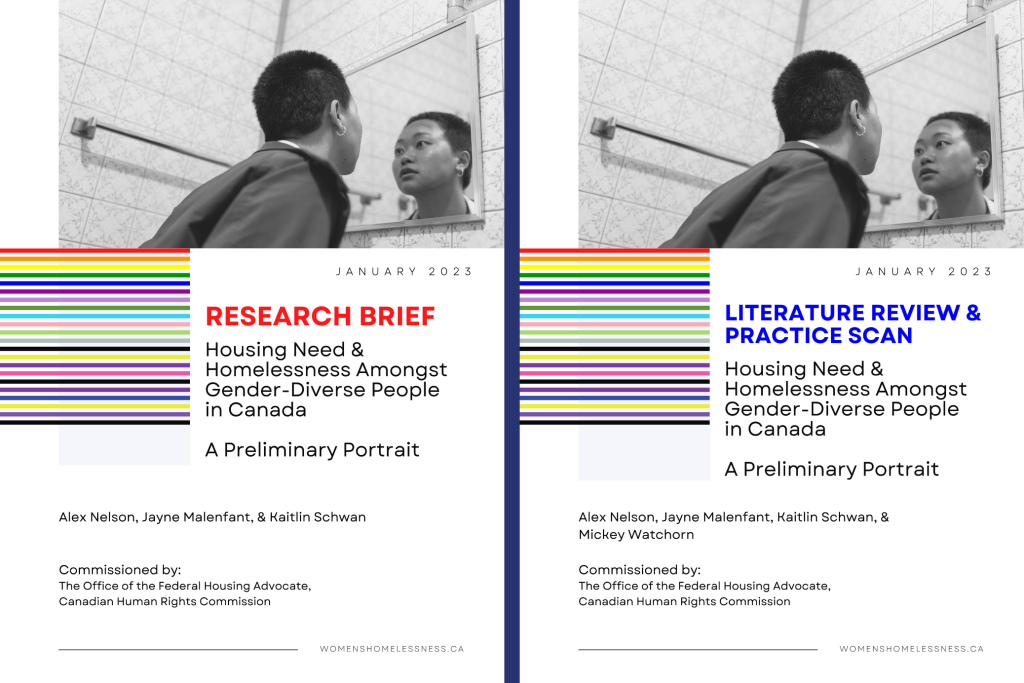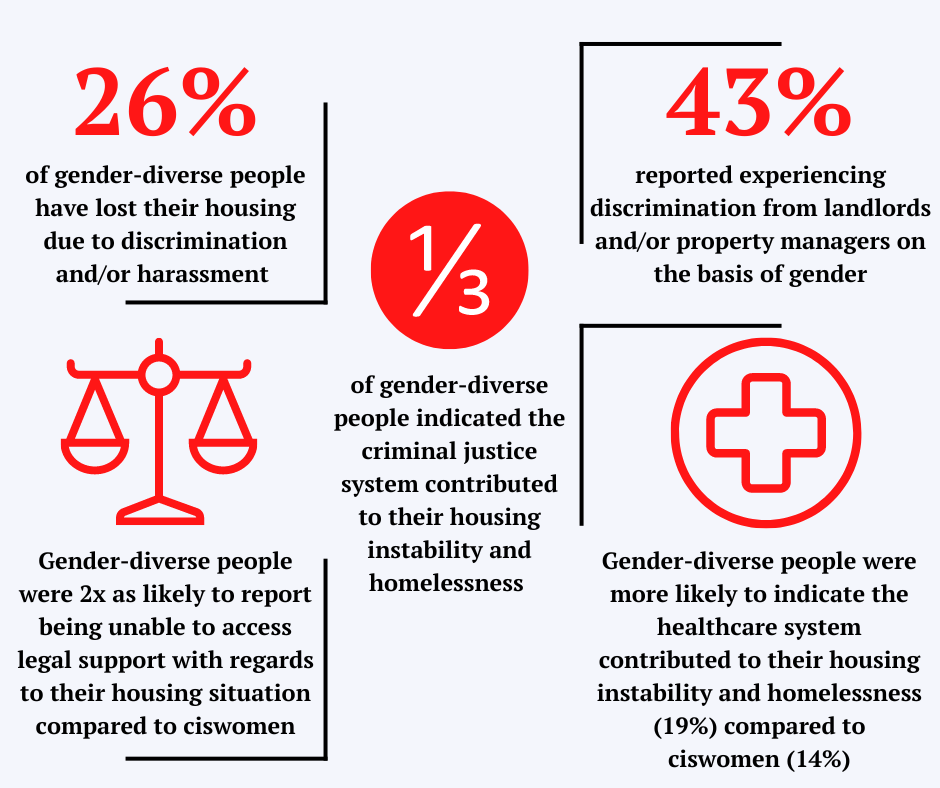By Alex Nelson, Jayne Malenfant, & Kaitlin Schwan
 Today we release two companion reports on homelessness and housing need amongst gender-diverse people in Canada, highlighting pervasive human rights violations. Commissioned by the Office of the Federal Housing Advocate, our research indicates that Canada’s housing and homelessness sector frequently marginalizes, undermines, and discriminates against those who do not adhere to strict binary notions of gender. Gender-diverse, Two-Spirit, and trans people face significant, intersecting human rights violations when it comes to housing and accessing emergency shelters, and are more likely to experience hidden homelessness. These new reports examine some of these experiences and systemic failures, charting a path towards realizing the right to housing for these communities in Canada.
Today we release two companion reports on homelessness and housing need amongst gender-diverse people in Canada, highlighting pervasive human rights violations. Commissioned by the Office of the Federal Housing Advocate, our research indicates that Canada’s housing and homelessness sector frequently marginalizes, undermines, and discriminates against those who do not adhere to strict binary notions of gender. Gender-diverse, Two-Spirit, and trans people face significant, intersecting human rights violations when it comes to housing and accessing emergency shelters, and are more likely to experience hidden homelessness. These new reports examine some of these experiences and systemic failures, charting a path towards realizing the right to housing for these communities in Canada.
What did we learn in our research?
Our research reveals a significant and emerging body of knowledge on experiences of discrimination, exclusion, and violence resulting in housing need and homelessness for Two-Spirit, transgender, nonbinary, and gender-diverse people across Canada. Drawing on a review of the academic and grey literature, interviews with lived experts, focus group data from This is Not Home, and findings from the Pan-Canadian Women’s Housing and Homelessness Survey (Pan-Canadian Survey), these reports construct a portrait of human rights violations experienced by these communities – and the findings are staggering.
Here are six key findings from the Pan-Canadian Survey:
1. Poverty, Violence, & Trauma over the Lifecourse
Many gender-diverse persons have experienced significant violence and trauma throughout their lives – before, during, and after experiences of housing precarity or homelessness. In the Pan-Canadian Survey, a majority of gender-diverse participants identified as being a survivor of trauma and abuse (84%), and 21% identified as having been involved in sex trafficking (double that of cisgender women (10%)). These experiences were underscored by poverty. Even amongst highly marginalized groups, gender-diverse persons are experiencing some of the deepest forms of income insecurity and poverty. The Pan-Canadian Survey found that to make ends meet in their most recent housing situation, 41% of gender-diverse people had cut back on necessities and 39% had borrowed money or went into debt.
2. Inadequate Housing Conditions
On average, gender-diverse people reported having histories of poorer housing conditions – and more housing problems – than their cisgender counterparts. Data indicated:
- 44% of gender-diverse participants reported having to move out of their housing due to problems with the condition of the housing (e.g., bedbugs, no heat, etc.)
- 69% of gender-diverse people reported being unable to find or maintain housing due to affordability issues
- 41% reported feeling unsafe in their place or their neighbourhood
3. Discrimination and Exclusion within Housing Systems
Discrimination and discriminatory treatment infuses the experiences of Two-Spirit, transgender, nonbinary, queer, and gender-diverse people in navigating the housing system. Pan-Canadian Survey data indicated that on every single category of discrimination (e.g., race, income, pets, religion), gender-diverse persons were more likely to report experiencing discrimination by a landlord and/or property manager than cisgender women. We found:
- 26% of gender-diverse people have lost their housing due to discrimination and/or harassment
- 43% reported experiencing discrimination from landlords and/or property managers on the basis of gender
- 41% reported having experiences of discrimination and/or judgment from staff at homeless shelters and/or drop-ins
4. Public System Failures
Research demonstrates that gender-diverse people experience multiple, compounding public systems failures within the legal, education, child welfare, immigration, and healthcare systems, all of which intersect to exclude and demean gender-diverse people in a variety of ways. Analysis of the Pan-Canadian Survey found:
- 19% of gender-diverse people indicated the healthcare system contributed to their housing instability and homelessness
- Almost a third of gender-diverse people indicated the education system contributed to their housing instability and homelessness (28%)
- A third of gender-diverse people indicated the criminal justice system contributed to their housing instability and homelessness (33%)
- Gender-diverse participants were significantly more likely to have child welfare system involvement as a child (43%) compared to cisgender women (26%)
- 56% of gender-diverse participants reported encounters with the criminal justice system

5. Security of Tenure Issues
While all people experiencing housing precarity or homelessness commonly face significant barriers to security of tenure, a number of data points in the WNHHN Survey suggest that these challenges are significantly heightened for gender-diverse people. We found:
- 46% of gender-diverse people lost their most recent housing due to a breakup
- 43% of gender-diverse people lost their most recent housing because they were told to leave by someone they live with
- Gender-diverse people were twice as likely to report being unable to access legal support with regards to their housing situation (51%) compared to cisgender women (24%)
6. Navigating Homelessness & the Shelter System
Two-Spirit, non-binary, and gender-diverse people face many barriers to accessing shelters and housing supports, and are underserved within social systems broadly. A particular point of exclusion lies in the binary organization of the homelessness sector, where services are often dedicated to cis men and women. Gender-diverse people were significantly more likely to be unable to access a shelter bed when they needed one (56%) than cisgendered women (34%), according to the Pan-Canadian Survey. When accessing shelter or drop-in spaces, gender-diverse respondents were significantly more likely to report being excluded due to explicit policies and practices, including being barred or having service restrictions (33% for gender-diverse people compared to 16% for cisgender respondents) and being turned away due to capacity issues (46% vs 27%). Particularly noteworthy is that experiences of trauma and homelessness began early in life for gender-diverse participants —almost half became homeless before turning 16.
Advancing the Right to Housing for Women & Gender-Diverse People in Canada – Where do we go from here?
Across Canada, Two-Spirit, trans, nonbinary, and other gender-diverse people are experiencing crisis-level inequities in accessing their social and economic rights, including the right to housing. Our research suggests that violations of the right to housing faced by gender-diverse people are underpinned by discrimination, exclusion, and violence – all of which is exacerbated by the dire lack of affordable housing in communities across Canada. Despite existing programs that, on their surface, claim to create the supply of housing that is so desperately needed, there is evidence that they will continue to fall short of meeting the needs of gender-diverse people without significant GBA+ and human-rights informed restructuring. Federal investments under the National Housing Strategy, the Rental Construction Financing Initiative being a prime example, fail to meet the needs of low-income households or people living in core housing need. This is because they are not actually reflective of these households’ capacity to pay. In addition to gender-responsive policies, programs, and practices, there is a deep need to create a sufficient stock of housing that is affordable for gender-diverse people, while also upholding the human rights and inherent dignity of these communities. For housing to be truly adequate for gender-diverse people, it should provide a more robust sense of security and safety, and offer the ability to live without the pervasive threat of eviction, discrimination, over-surveillance, and violence.
In this context, our reports are a starting point for mapping a rights-based path forward. They indicate how much more needs to be done. Advancing the right to housing for gender-diverse communities must centre engaging people with lived experience of gender-based discrimination and homelessness in robust, ongoing, and meaningful ways.
Engaging communities of lived experience is more than a recommendation in creating more robust policy: it is a fundamental principle of realizing the right to housing. In the absence of responses that take into account the realities of gender-diverse peoples lives, housing policies, programs, and systemic barriers will continue to maintain the status quo and invisibilize the experiences and violate the rights of gender-diverse people in Canada.

